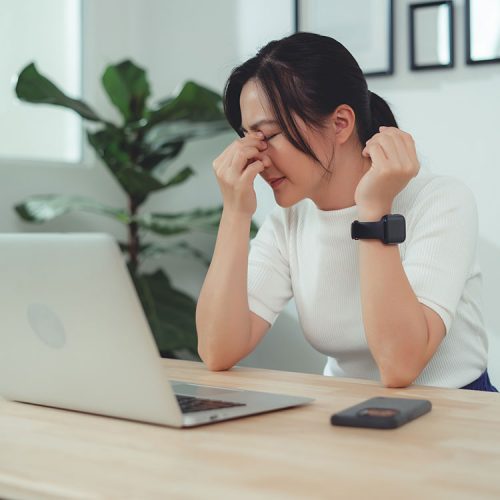Whether you are talking about a cell phone, tablet, computer, or smart TV, the efficiency they provide is inarguable. However, these benefits often come with a price – eyestrain.
The Vision Council reports that 80 percent of Americans report using at least one device for more than two hours a day, with 67 percent acknowledging that they often use more than two devices at a time. And, not surprisingly, 59 percent suffer from digital eyestrain.1
Eyestrain is marked by dry, tired eyes and blurry vision. One of the main reasons for this is a lack of blinking. Normally, the average person blinks 15 times or more per minute, which keeps your eyes lubricated and reduces irritants. However, research shows that when you look at a screen, you blink half as often. This results in less lubrication and more irritation.
Add to this the glare of the screen, the blue light emission, and the poor contrast between text and background image or color, and it’s no wonder that your eyes pay the price.
Fortunately, there are several things you can do to reduce device-related eyestrain, particularly at the office:
- The 20/20 rule: Every 20 minutes, focus on something at least 20 feet away for at least 20 seconds. This will give your eyes a chance to relax and reduce fatigue.
- Adjust screen settings: You can also make a few changes to your current screen to reduce eyestrain. Make sure the brightness is neither too bright nor too gray. It should be subtle, not a light source. Additionally, adjust the color temperature of the screen. Blue light can induce strain, so lower the amount of blue, aiming for more in the orange or yellow realm.
- Upgrade to LED (Light Emitting Diode): The older tube-style monitors (cathode ray tube or CRT) can cause images to flicker. That flicker, even if indiscernible, can cause eye fatigue. Conversely, an LED screen, particularly with an anti-reflective surface, is gentler and more soothing to the eye.
- Computerize your glasses: If you wear eyeglasses, talk to your eye care professional about modifying them for device use. If you wear progressives, consider switching to single-vision lenses for close reading. You can also ask for a blue light coating to ease strain from the blue light emission. And if you normally wear contacts, consider glasses instead, as your contacts can become dry and irritated with extended device use.
- Customize your work area: The positioning of both your chair and the computer screen can affect the comfort of your head and neck as well as your eyes. Be sure your chair height is such that your feet rest comfortably on the floor. Adjust your computer screen to be 20-24 inches away from your eyes and the center of the screen 10-15 degrees below your eyes for ideal comfort.
By following these simple tips, you can enjoy your devices AND protect your vision.
References
- The Vision Council. https://www.thevisioncouncil.org/content/digital-eye-strain
